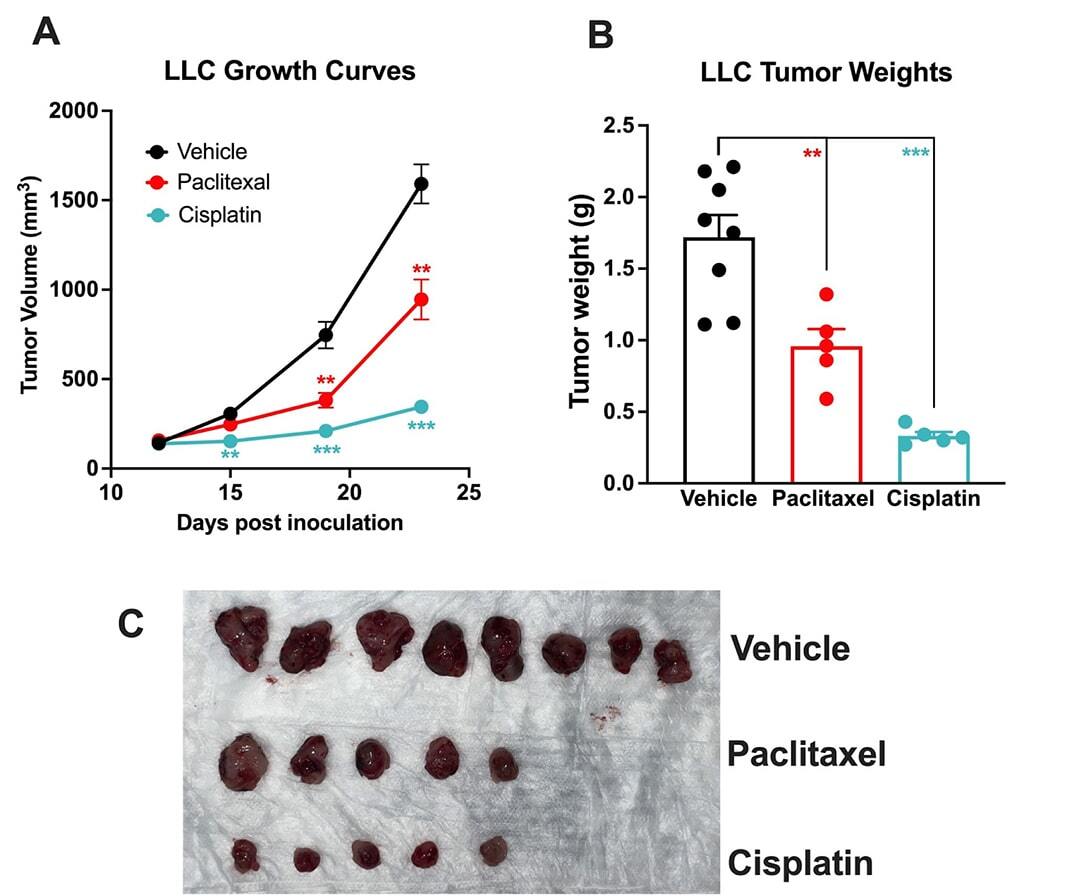The LLC Tumor Model for Lung Cancer
Screen your groundbreaking chemotherapeutics using the trusted Lewis lung carcinoma mouse model.
Lung cancer is a significant public health concern. This common and serious cancer has the highest mortality rates of all cancer types. Chemotherapy continues to be a crucial component of lung cancer treatment, but there is still a considerable need for more efficient therapies.
You can evaluate your novel cancer therapeutics with Melior’s reliable Lewis lung carcinoma mouse (LLC) model and benefit from the enhanced reproducibility of this popular lung cancer model.
The Current LLC Treatment Landscape
Evaluate Your Chemotherapeutic With The LLC Tumor Model
Work With Consistency Using The LLC Tumor Model
Our well-established lung cancer model is an early screening tool for your novel chemotherapeutic that ensures you progress with the best candidates.
Experience an LLC tumor model that is:
- Fast growing
- Extensively used in the field
- Consistent tumor growth rates for chemotherapeutic development
- Compatible with Melior’s xenograft lung cancer model
- Highly representative of the human adenocarcinoma subtype
Tailor-made Services: Designed with You in Mind
The LLC tumor model, like all of our syngeneic mouse models, includes efficient processes and expert guidance.
Our bespoke analyses include:
- Tissue collection for immune cell analysis and profiling
- Whole blood, spleen, and lymph node analysis
- General observations, including pain analysis
- Histology and IHC
- Luciferase assay
- IVIS imaging
- FACS analysis
- PK studies
Our custom support services include:
- Face-to-face zoom calls
- Ad-hoc consultation
- Customized study proposals
- Direct line to experienced project managers
- Hands-on revision support
Don’t see what you’re looking for? Contact us for a comprehensive list of services.
Expand Your Applications with Immuno-theraTRACEⓇ
If you are looking for a fast and efficient way to screen immune-modulating agents, including immune checkpoint inhibitors, our oncology platform, Immuno-theraTRACEⓇ, allows you to test your immunotherapeutic across 8 syngeneic models.
Pair this platform with our LLC tumor model for a complete toolbox that evaluates and advances your cancer therapy in weeks.
Data Highlights: LLC Tumor Model Chemotherapy Validation
Subcutaneous Lung Cancer Model with Cisplatin and Paclitaxel
Chemotherapy Validation of the Lewis Lung Carcinoma Model.
This lung cancer model was created by injecting 2 x106 LLC cells into the rear flank of C57Bl/6 mice. Once mean tumor size reached 100~150mm3, the mice were randomized into 3 groups (Day 12): vehicle (IP normal saline), paclitaxel (30 mg/kg, IP twice per week), or cisplatin (4 mg/kg, IP twice per week). Tumor volume was monitored twice per week using calipers (A). At the end of the study (Day 23), animals were sacrificed, and tumors were excised and weighed (B, C). Both cisplatin and paclitaxel significantly inhibited tumor growth. Data are mean ± SEM; n=8 for the vehicle, n=5 for both paclitaxel and cisplatin; ** P<0.01, *** P<0.001 by Student’s t-test.
A Spotlight on Targeted Cancer Therapy
The LLC tumor model has uncovered new drug targets on the nanoscale. For instance, P-selectin is a molecule expressed on cancer cells that has an important role in cancer metastasis. This makes it a potential target for treating late-stage cancers.
Targeted drug delivery systems localize chemotherapeutics to specific target sites where they will have the best efficacy. In the near future, they may play a key role in improving chemotherapy and other cancer treatments.
The LLC tumor model continues to pioneer new strategies that target disparate drug classes on almost any tumor. Work like this is a bold step toward a world where even the most persistent lung cancers are treatable.
Are You Ready to Advance Your LLC R&D?
Citations
1. World Health Organization (2023) Lung Cancer. Available at: https://www.who.int/news-room/fact-sheets/detail/lung-cancer. (Published 26 June 2023, Accessed: 15 August 2023).
2. National Cancer Institute (2023) Lung Cancer Treatment.Available at:https://progressreport.cancer.gov/treatment/lung_cancer. (Published August 2023, Accessed: 17 August 2023).
3. Shamay, Y., Elkabets, M., Li, H., Shah, J., Brook, S., Wang, F., Adler, K., Baut, E., Scaltriti, M., Jena, P.V. and Gardner, E.E., 2016. P-selectin is a nanotherapeutic delivery target in the tumor microenvironment. Science translational medicine, 8(345), pp.345ra87-345ra87.




 Interested in running a Lewis lung cancer model study?
Interested in running a Lewis lung cancer model study?